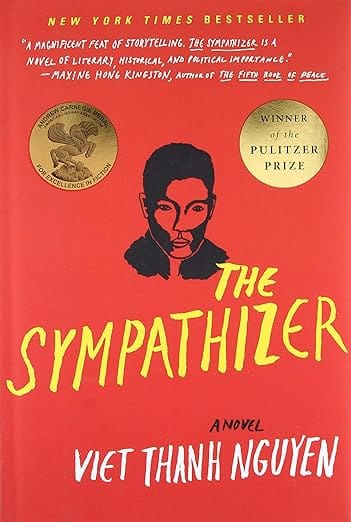Book Review: The Sympathizer

The Sympathizer has been one of the most shocking books I've read in the last decade. Viet Thanh Nguyen's Pulitzer Prize-winning novel forces readers into an uncomfortable position: witnessing sexual violence they cannot prevent, mirroring the protaganist's own paralysis as he watches South Vietnamese policemen rape a female communist agent. This brutal and explicit scene raises a question I've found myself struggling with: Is depicting such acts of horror necessary or does it reproduce the very violence it critiques?
Nguyen has been remarkably candid about his choice. In an interview in 2025 he said: "Two-thirds of the way through the novel, I realized who my narrator was [...] I liked him a lot... But I also had to understand that he was misogynistic and masculine, and that I was enjoying that as a writer." This realization led him to push the narrator's casual objectification of women to its logical extreme: sexual violence. The rape scene functions as moral reckoning. Readers who enjoyed the Captain's womanizing and masculine camaraderie must confront where that spectrum of misogyny leads. As Nguyen argued, "If I didn't go there, I would be making a mistake, and if I did go there, I would be making a lot of people uncomfortable—but that is actually what they should feel." I am still confronting this uncomfort weeks after reading the final chapters of this novel.
The communist agent's name—"Viet Nam" makes explicit what scholar Sylvia Shin Huey Chong identifies as the novel's central tension: Vietnamese women's bodies serve as the site where violence against the nation is enacted and understood. The rape of Vietnamese women by Vietnamese men represents not just American imperialism but the internalized violence colonialism leaves behind.
This connects to the novel's critique of orientalist representation. The Hollywood film-within-the-novel, "The Hamlet," includes a rape scene the Auteur defends as "realistic" because "rape happens" in war. Yet Nguyen's novel then includes its own rape scene, creating what Chong calls an "unresolvable ethical bind". The protaganist in the novel doesn't commit rape, but he witnesses it, unable or unwilling to intervene. This distinction proves crucial. The novel explores how war implicates those who watch, benefit from, or fail to prevent atrocity. The Captain holds a Coke bottle throughout the rape, which the policemen then use to violate the woman. His passivity becomes weaponized. During the protagonist's own torture in a reeducation camp, his interrogator Man forces him to remember this complicity. The torture serves not to extract information but to make the Captain acknowledge: you could have acted, you didn't, and that silence makes you guilty. For most Americans, Nguyen suggests, this is how war matters, not through direct violence but through comfortable distance.
Slyvia Chong asks: "Is it possible to write war without traveling through the abject trope of rape?" The novel's treatment of female characters, primarily as victims whose suffering catalyzes male moral awakening, suggests the answer may be no, at least within the masculine war narrative tradition Nguyen both inhabits and critiques. The novel declares: "Massacre is obscene. Torture is obscene. Three million dead is obscene." By this logic, being disturbed by sexual content while accepting mass violence reveals our moral failures. Yet this argument doesn't resolve whether replicating gendered violence serves justice or simply aestheticizes suffering and misogyny.
What remains is discomfort, which might be precisely Nguyen's point. We cannot look away, cannot claim innocence, cannot separate the pleasures of narrative from complicity in violence. The question isn't whether sexual violence makes us uncomfortable, but whether our discomfort produces a deeper understanding of society's broader problems or merely voyeurism and immoral entertainment.

Member discussion